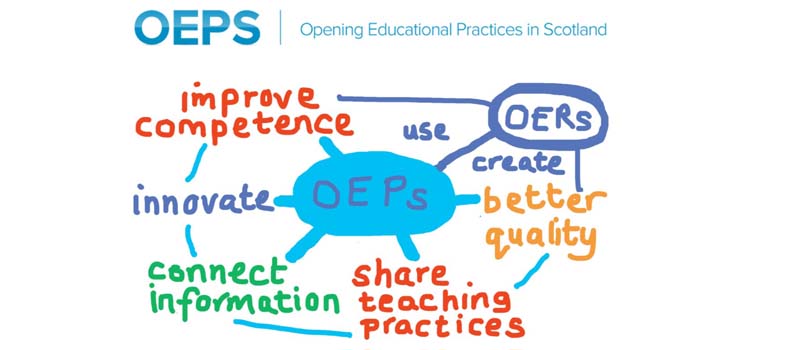City of Glasgow College
With a background in e-learning, John Casey, Senior Learning technologist at City of Glasgow College, can see enormous potential for open education within the college sector. Over a career that has spanned both universities and colleges, John has witnessed how small changes in teaching practice can radically impact pass rates. For example, at one college the pass rate of an engineering course increased dramatically when all lecturers agreed to use the same text book (which was also available to students) instead of their own teaching notes.
John is keen to apply that kind of learning to open educational practice (OEP) to realise similar and additional benefits. For example, in his view open text books for college courses could standardise the teaching as well as offer savings for both students and the college. In addition, open text books would allow for greater flexibility around assessments including "challenge exams" i.e. assessments that are open to everyone regardless of attendance.
Attending Opening Educational Practices in Scotland (OEPS) forums confirmed to John that others were thinking along similar lines and has inspired him to persist with open education initiatives. When he subsequently submitted a consortium bid to Erasmus Plus with four European partners to promote learning through open educational resources (OER), he got useful input and support from the OEPS team. Although the bid was rejected, John plans to resubmit the application now that reassurances have been given about European funding following Brexit. A separate application to the Ufi charitable trust has successfully reached the second round. If successful, the award would be used to create OER for vocational literacy skills and an open source toolkit, which would enable people to create their own open textbooks. The initiative (which would be taken forward by City of Glasgow College in partnership with the College Development Network, Citizen Maths, Forth Valley College, Institute of Education, The Open University and ReachWill Ltd.) aims to reach 2,500 learners through developing OER that can be used on smartphones and are accessible with assistive technologies.
As a consequence of attending an OEPS forum, John was also invited to present to the open team at the University of Edinburgh on 'Clipper', a collaboration between City of Glasgow College, The Open University and Reachwill Ltd which is exploring how audio and video clips can be incorporated into OER.
OEPS also provided advice to John as he embarked on designing an open badged course on e-assessments. The course is based on an existing guide book which sets out how to design e-assessments. The open course has been approved by the College E-assessment Group, an SQA forum with representatives from the colleges, and will be released later this year.
Within City of Glasgow College, John has raised awareness around OER through publicising the forthcoming open course on e-assessments as well as his involvement with OEPS, but he believes there is currently very little awareness of open education in the college sector beyond those staff working in libraries or on e-learning. While teacher training for college lecturers touches on the technology available, it doesn't refer to open educational practice at all.
To realise the benefits that OEP could offer, John believes there are a range of barriers that need to be tackled including: a lack of funding; limited engagement from senior staff; and a change in culture both within the teaching profession and within SQA. He points to the United States where OEP is only now beginning to bear fruit, with the introduction of mandatory open text books, despite political engagement and funding since the late 1990s . In John's view, if we are to capitalise on the opportunities offered by OEP we need policy interventions at Scottish Government level and sustained support for OER activities, such as OEPS, over the long term.
